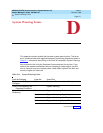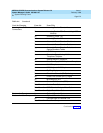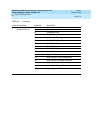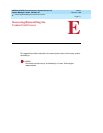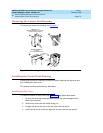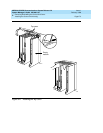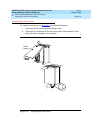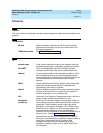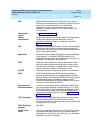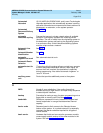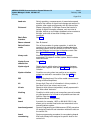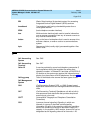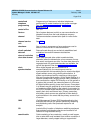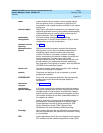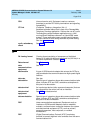
MERLIN LEGEND Communications System Release 6.0
System Manager’s Guide
555-660-118
Issue 1
February 1998
Page GL-1
Glossary
GL
Glossary
Italics
The use of italics in the glossary denotes multiple usage of the italicized text throughout the
glossary.
Numerics
A
2B data Digital information carried by two
B-channels
for better
performance and quality; the
bit rate
is twice that of one
B-channel used alone.
7500B data module See
ISDN 7500B Data Module
account code Code used to associate incoming and outgoing calls with
corresponding accounts, employees, projects, and clients.
ACCUNET AT&T’s switched digital service for 56-kbps, 64-kbps
restricted, and 64-kbps clear circuit-switched data calls.
address A coded representation of the destination of data or of the
data’s originating terminal, such as the dialed extension
number assigned to the data terminal. Multiple terminals on
one communications line must each have a unique
address.
ADDS (Automated Document Delivery System) Computer-based
application that stores documents in a database and
automatically faxes them on request.
adjunct Optional equipment used with the communications system,
such as an alerting device or
modem
that connects to a
multiline telephone or to an extension jack.
ALS (Automatic Line Selection) Programmed order in which the
system makes outside lines available to a user.
ambiguous
numbering
Numbering of extension ranges, remote access codes, or
other system components that causes conflicts in network
operations. These numbers can be unique and still be
ambiguous. For example, Extension 441 is different from
Extension 4410. However, for
UDP routing
purposes, the
two numbers are ambiguous and a call intended for
Extension 4410 is misrouted on the first three digits sent, to
Extension 441. See also
unambiguous numbering
.
Glossary 5
Italics
The use of italics in the glossary denotes multiple usage of the italicized text throughout the
glossary.
Numerics
A
2B data Digital information carried by two
B-channels
for better
performance and quality; the
bit rate
is twice that of one
B-channel used alone.
7500B data module See
ISDN 7500B Data Module
account code Code used to associate incoming and outgoing calls with
corresponding accounts, employees, projects, and clients.
ACCUNET AT&T’s switched digital service for 56-kbps, 64-kbps
restricted, and 64-kbps clear circuit-switched data calls.
address A coded representation of the destination of data or of the
data’s originating terminal, such as the dialed extension
number assigned to the data terminal. Multiple terminals on
one communications line must each have a unique
address.
ADDS (Automated Document Delivery System) Computer-based
application that stores documents in a database and
automatically faxes them on request.
adjunct Optional equipment used with the communications system,
such as an alerting device or
modem
that connects to a
multiline telephone or to an extension jack.
ALS (Automatic Line Selection) Programmed order in which the
system makes outside lines available to a user.
ambiguous
numbering
Numbering of extension ranges, remote access codes, or
other system components that causes conflicts in network
operations. These numbers can be unique and still be
ambiguous. For example, Extension 441 is different from
Extension 4410. However, for
UDP routing
purposes, the
two numbers are ambiguous and a call intended for
Extension 4410 is misrouted on the first three digits sent, to
Extension 441. See also
unambiguous numbering
.
AMI (alternate mark inversion) Line coding format in which a
binary one is represented by a positive or negative pulse, a
binary zero is represented by no line signal, and
subsequent binary ones must alternate in polarity;
otherwise, a
bipolar violation
occurs. AMI is used in the
DS1
interface.



